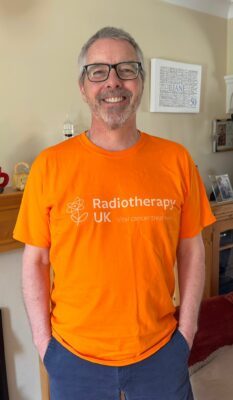 Andy Tudor, 59, shares his story of diagnosis and treatment for a meningioma brain tumour. Andy is a retired engineer, and volunteers as a patient advocate with Radiotherapy UK, as well as giving his time to our patient engagement work.
Andy Tudor, 59, shares his story of diagnosis and treatment for a meningioma brain tumour. Andy is a retired engineer, and volunteers as a patient advocate with Radiotherapy UK, as well as giving his time to our patient engagement work.
How was your cancer diagnosed?
I was originally diagnosed in A&E after being rushed to hospital with life threatening symptoms of severe headaches, uncontrolled vomiting, an inability to move my right arm and leg and unable to talk. My initial meningioma brain tumour was diagnosed there.
I also had recurrence of my brain cancer which was discovered during a routine MRI scan 5 years after my first brain tumour diagnosis.
What treatment/s did you have?
I had a craniotomy (brain surgery) to remove my original brain tumour.
I had stereotactic radiotherapy (Gamma Knife) to treat my recurrence.
What was your experience of radiotherapy?
I found Gamma Knife radiotherapy was quick and relatively easy. The mask fitting wasn’t pleasant, but my treatment was in one session of around 40 minutes, with very mild side effects. All the NHS staff were hugely supportive and highly professional.
Did you experience side or late effects?
I only had mild side effects of around 10 day’s extra tiredness, and my hair fell out over the treatment site. It soon regrew.
What helped you cope with cancer?
Getting prompt world class service helped me cope with cancer. Also charity support groups online were particularly helpful and supportive for me and my family.
My family helped me cope the most, keeping me positive and treating me as normal.
What did you find hard?
I found the sudden realization that I was seriously ill, and there was a chance I wouldn’t pull through, very hard at first.
After my initial treatment it took many months to recovery, and I’ve been left with some permanent deficits which can be hard to deal with.
How are you now?
My recurrence has been successfully treated by my radiotherapy, and I’ve learned to manage the ongoing deficits to ensure a good quality of life.
Any advice for others?
Try and stay positive, keep your sense of humour and don’t be afraid to ask questions of everyone you meet. Seek support from others who have been though something similar to get a better understanding of what you are dealing with and how to better cope.
Anything else you would like to share?
Remember your diagnosis and treatment are just as tough for your family and friends, and they may well need additional support too.
